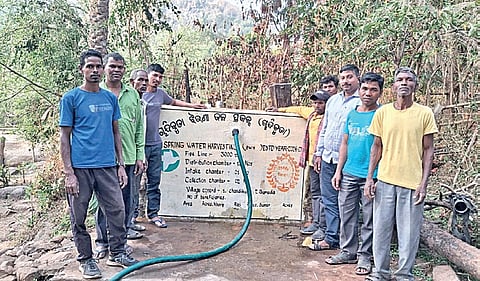

GAJAPATI: April will no longer be the cruellest month for Guruda village in Gajapati district. Their farms will be lush, the expanse of dead land breeding lilacs too. The migrants will not look for way across to greener pastures on the other side.
For, the inhabitants in one of the most remote and virtually inhospitable terrains have tamed a waterfall, solving the major cause of their misery and hardships.
Located about 25 km from R Udayagiri, the village inhabited by the primitive Saora tribals was affected by a perennial water shortage. There was no water body nearby and the mountainous and rocky landscape made it impossible for digging wells or even boring tube wells as the groundwater table was found more than 200 ft deep. The villagers had measly farmlands which were completely rain dependent for cropping and thus remained useless for the larger part of the year.
Daily life was also almost a curse for the families as water was available only at the waterfall atop the mountain - a steep 2 km climb. The womenfolk were forced to go up the mountain at least three to four times a day for all their chores and family necessities - from answering nature’s call, bathing to fetching water for the household. Though toilets have been constructed under Swachh Bharat Mission, unavailability of water had rendered them unusable. The situation was such that year after year entire families would migrate to outside states in search of work and then subjected to exploitation.
Guruda, today, stands as a sterling example of transformation. Pipelines run through the village down to the fields, providing water to the households and irrigating the crops. The wasteland even has turned fertile giving the tribals more fruit for their labour.
Things took a positive turn for the villagers last year when a Berhampur-based NGO - Institute of Social Action and Research Activities (ISARA) came to know about the hardships faced by them. ISARA’s experts and engineers visited the spot and found that it was possible to install pipes on the mountain to ensure uninterrupted water supply to the village.
However, laying pipelines through the treacherous expanse of more than 3 km was a daunting task. The plan required huge manpower and cost. The villagers then stepped in and volunteered labour to set up the water pipes. Now, the waterfall’s vicinity has a full-fledged inlet chamber where the stream water is stored and discharged using regulators. The water then passes through the pipes to two collection chambers and is dispersed to the households and agricultural fields. The chambers were constructed and pipelines laid in just about 40 days.
The spring water harvesting system in Guruda village became operational about six months back. Apart from their agricultural fields, the tribals have also turned about 15 acre wasteland fertile, and are harvesting organic fruits and vegetables like potato, onion, tomato, brinjal, pumpkin, okra, ridge gourd, cauliflower, cabbage, green chili, banana, etc. They have started generating their own income by selling the produces in local haats, ISARA founder secretary Rabindra Nath Patra said.
“I worked as a labourer in different states before returning to my village. With the availability of water, our entire family is now engaged in farming. We have now become self-dependant,” said Jayab Raita, a villager. Patra said, in the next five years, the agriculture is expected to double and spread over 30 acre of land.